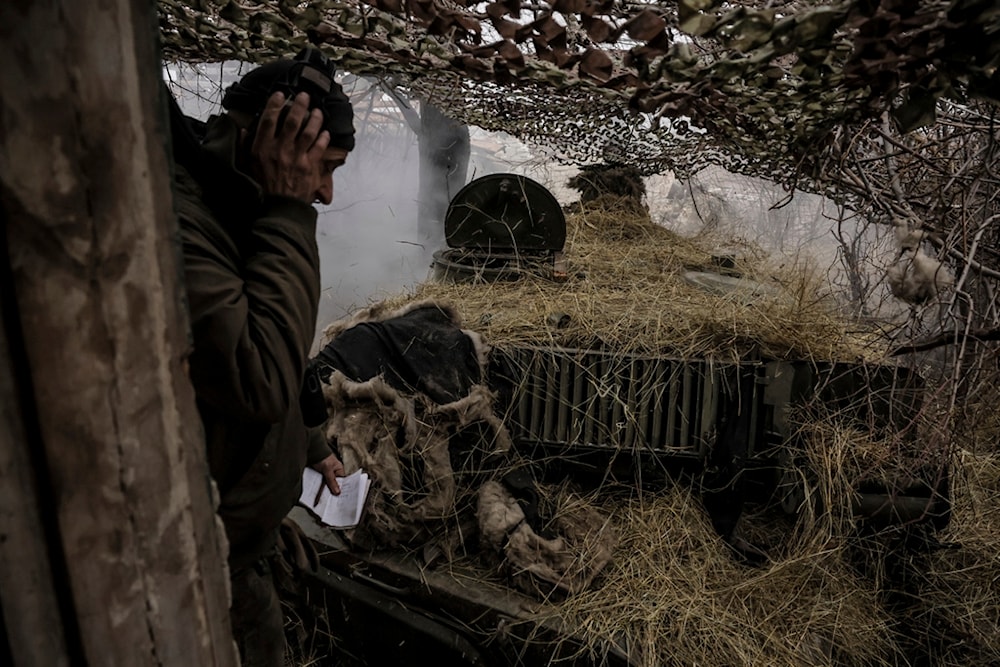European nations weigh deployment of 30,000 troops to Ukraine: WashPo
A high-level security summit is set to take place in Paris, gathering leaders from Germany, the United Kingdom, Italy, Poland, Spain, the Netherlands, and Denmark, along with EU and NATO officials.
-

In this photo provided by Ukraine's 24th Mechanised Brigade press service, servicemen fire 2s1 self-propelled 122mm howitzer towards Russian positions on the front line near Chasiv Yar, Donetsk region, Ukraine, Thursday, Feb. 7, 2025. (Oleg Petrasiuk/Ukraine's 24th Mechanised Brigade via AP)
European nations are reportedly discussing the deployment of 25,000 to 30,000 military personnel to Ukraine, though they would not be positioned near the front lines, The Washington Post reported on Monday. The proposal is part of ongoing deliberations among Western leaders on how to reinforce Ukraine's security without provoking direct military escalation with Russia.
The debate over European military involvement has gained traction as the United States moves to negotiate directly with Russia in upcoming talks hosted by Saudi Arabia—without European or Ukrainian representatives. This shift has alarmed European leaders, prompting calls for a stronger, independent European security strategy. French President Emmanuel Macron has urged European nations to take more responsibility for their defense, warning that reliance on US policy could leave Europe vulnerable.
An official from Macron's office explained to reporters that due to "the acceleration of the Ukrainian issue, and as a result of what US leaders are saying, there is a need for Europeans to do more, better and in a coherent way, for our collective security."
Paris Summit to Address European Defense Strategy
Against this backdrop, a high-level security summit is set to take place in Paris, gathering leaders from Germany, the United Kingdom, Italy, Poland, Spain, the Netherlands, and Denmark, along with EU and NATO officials. The meeting will focus on Ukraine's security as the war nears its third anniversary on February 24, while also addressing European concerns over Washington's shifting stance.
The urgency of the summit intensified after US Vice President JD Vance sparked tensions at the Munich Security Conference by downplaying the "Russian threat" and instead blaming Europe's "self-inflicted political instability." His remarks were swiftly rebuked by German Chancellor Olaf Scholz, who responded:
"We will not accept outsiders intervening in our democracy, in our elections. That is not appropriate—especially not among friends and allies."
Read more: Germany's Scholz slams Vance's remarks as 'foreign intervention'
Sweden Signals Willingness to Send 'Peacekeepers'
Amid growing European discussions on security, Sweden has stated that it does not rule out sending troops to Ukraine as part of a future peacekeeping mission. Foreign Minister Maria Malmer Stenergard told Sveriges Radio:
"First, we must agree on a just and lasting peace, which respects international law and Ukraine ... As soon as this peace is achieved, we will have to ensure that it is maintained. In this case, our government does not rule out anything."
Swedish Prime Minister Ulf Kristersson added that any deployment would require a clear international mandate, saying:
"We will take part in those discussions and of course that is absolutely a possibility ... There needs to be a very clear mandate for those forces and I don't think we can see that until we have come further in those negotiations."
While Ukraine has not formally requested Swedish troops, Sweden has played a key role in military aid to Kyiv, supplying tanks and artillery. The country also recently deployed troops to Latvia as part of a NATO brigade, marking its largest military mission since joining NATO in 2024.
Read more: Sweden open to deploy 'peacekeepers' to Ukraine under right conditions
Alongside Sweden, the United Kingdom and France are also exploring the possibility of a European-led peacekeeping force for Ukraine. Reports indicate that UK Prime Minister Keir Starmer and French President Emmanuel Macron have begun early discussions about deploying a multinational force once a peace deal is reached.
Russia's Opposition and Strategic Concerns
Russia has been vocal in its opposition to any Western troop presence in Ukraine, viewing it as a disguised occupation. In November 2024, the Russian Foreign Intelligence Service (SVR) claimed that 100,000 Western troops could be sent to restore Ukraine's military capabilities under the label of peacekeeping.
The Kremlin, through spokesperson Dmitry Peskov, has warned that such actions could escalate tensions, reiterating:
"The deployment of peacekeepers is possible only with the consent of the parties to a conflict."
Russian officials have also raised concerns over potential British and German troop involvement, arguing that a NATO-backed mission would further destabilize the region.

 4 Min Read
4 Min Read









